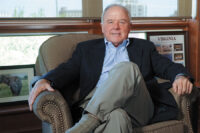Building support
Gov. Glenn Youngkin made headlines last December when he announced a $90 million-plus pitch to launch “Virginia’s Research Triangle.” Initially envisioned as a cooperative initiative among Virginia Commonwealth University, Virginia Tech and the University of Virginia, the triangle was expanded into more of a rhombus following the addition of Old Dominion University to the research [&hell[...]
Health Care: A new horizon
Virginians could look back at 2024 a few years from now and see a turning point for health care in the commonwealth — the dawn of a “Virginia Research Triangle” in biotechnology, pharmaceutical manufacturing and medical research. In December 2023, the University of Virginia broke ground on the $350 million Paul and Diane Manning Institute […]
Gov. proposes $90M to launch ‘Va. Research Triangle’
In a preview of his 2024-26 proposed budget, Gov. Glenn Youngkin announced Monday that he is including $90 million in one-time funds to create “Virginia’s Research Triangle,” a network between the University of Virginia, Virginia Commonwealth University and Virginia Tech to build collaboration in biotechnology, life sciences and pharmaceutical manufacturing. Youngkin’s bien[...]
U.Va. breaks ground on Manning biotech institute
The University of Virginia began construction Friday on the $350 million Paul and Diane Manning Institute of Biotechnology. Paul and Diane Manning launched the institute with a $100 million donation in January. Paul Manning founded PBM Products, which became the world’s largest privately owned infant formula and baby food business, and sold it to Perrigo […]
Great expectations
In the mid-1990s, Diane and Paul Manning were thinking about moving from New Jersey with their three children. Like many families, they took many factors into consideration. “One of the kids was really big-time into swimming, so we needed a place that had a good swim team,” Diane says. Also, “I always prefer a college […]
Betting on biotech
Virginians have often sought experimental medical treatments outside the state — traveling to North Carolina, Boston or one of the Mayo Clinic’s locations. However, the Paul and Diane Manning Institute of Biotechnology at the University of Virginia aims to change that. “We intend to tackle the biggest challenges in health care and to empower our […]
Paying it forward
In the last year, Virginia philanthropists continued making generous donations toward health care research, while others maintained their longstanding support of art museums. Leading the pack were two nine-figure donations for medical research. In February 2022, Dr. Todd Stravitz, who built his expertise researching and treating liver disease, donated $104 million to Virginia Commonwealth Universi[...]
$100M donor gift to launch U.Va. biotech institute
The University of Virginia will build a biotechnology institute funded with a $100 million donation from Charlottesville investor Paul Manning and his wife, Diane, the university announced Friday. Along with the Mannings’ gift, U.Va. will contribute $150 million, and the state has allocated $50 million in initial investments for the institute in its 2022-24 budget, […]




















